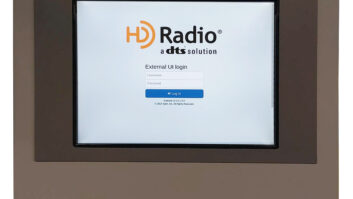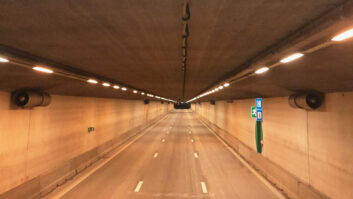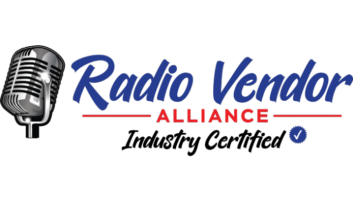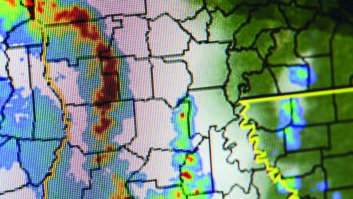
Christian Berger runs the desk while Daniela Fürst (left) interviews author Ekkehart Krippendorff (center). (Credit Thomas Voelkner) FRANKFURT — Frankfurt is known as a center for transport and finance, but those that are interested in literature praise Germany’s fifth-largest city for its role as host of an important international book fair.
Every year in October, almost 300,000 people attend the Frankfurt Book Fair, from publishers and literary agents to ordinary book lovers. In 2012, more than 7,300 companies from some 100 countries exhibited at the event. Naturally, the fair attracts a lot of media coverage, with broadcasters such as Hessischer Rundfunk, Deutschlandradio, 3sat and ARTE offering daily news reports as well as multi-hour public readings on their digital special-interest channels.
For the past 12 years, a small but unique radio project has also been part of this book fair, providing dozens of small broadcasters in German-speaking countries with audio content.
Unique project
Literadio, based in Austria, is a non-profit entity that brings together broadcasters, publishers, educators (libraries, schools), booksellers and authors. It organizes a daily series of 30-minute public readings, book presentations and round-table discussions.
Whatever is discussed on its small stage in Frankfurt is streamed live over the Internet and rebroadcast by non-commercial stations, campus radios and public access channels in Austria, Germany and Switzerland.
Once Literadio has aired an item, it becomes available for on-demand listening and time-delayed broadcasting (www.literadio.org). In addition, Literadio produces continuity announcements and various other audio idents that stations can use to link their program to the content coming from the book fair. Many stations make use of the offering: unsurprisingly, because it is a publicly funded entity, Literadio provides its services for free.

Literadio’s Christian Berger during the Frankfurt Book Fair. (Credit Thomas Voelkner) Christian Berger heads the Literadio project. As chairperson for “aufdraht,” an association of culturally- minded media people, he organizes radio training for children and young adults. He focuses mainly on radio as a means of communication between people and their ideas, rather than a means for commercial purposes.
Book fair visitors will definitely recognize Berger as the main person behind Literadio, as he frequently works the mixing desk that controls both audio signals, the one that is streamed over the Internet and the other for the local sound system at the stall. Very often, passers-by stop when they hear an interesting interview; they take a seat and watch live radio in the making.
With the help of one other technician, Berger also encodes audio for podcasts and adds new entries to the Internet blog. And if that were not enough, one can often witness him on stage when he interviews authors and publishers. In October 2012, Berger and three other editors were responsible for the content side of the project. On the whole, they produced some 25 live broadcasting hours with numerous guests.
Useful content

Literadio logo Among them was Ekkehart Krippendorff, a pioneer in peace studies of international renown; journalist Ulrich Ladurner who reports from Tehran for a leading German weekly; and Eva Rossmann who has written a series of well-received detective novels. Author Gerhard Ruiss and publisher Benedikt Föger discussed aspects of copyright and related laws, a topic that was highly talked about in the months after the failure of the Anti-Counterfeiting Trade Agreement, or ACTA.
In previous years, the list of guests included U.S. literary scholar Ruth Klüger and flamboyant publisher Klaus Wagenbach. Those who browse the Literadio Web archive thoroughly can find original recordings in English and other languages. Such recordings were made during a temporary project aiming at writers from European Union countries for which the EU provided funding, Berger remembers.
Running the book fair radio — which since 2006 also includes coverage from the Leipzig Book Fair, as well as from other events in Austria and Slovakia — comes with a price tag. The annual budget stands at around €25,000, says Berger. The Austrian federal government and the city of Vienna equally fund half of that amount, while various sponsors and donors, such as IG Autorinnen Autoren, an authors’ syndicate, shoulder the other half.

An overview of the Frankfurt Book Fair. Credit: Frankfurt Book Fair/PeterHirth Most of the work is done in a volunteer capacity, which, of course, considerably lowers the overall costs. The radio output is syndicated under the creative commons license, which allows stations to copy, distribute and transmit it as long as they credit the original authors, do not alter the content and do not use it for commercial purposes.
The Literadio project head is confident that small and exceptional radio projects can gradually change the output of bigger media companies. Berger says he knows several editors at Austria’s public broadcaster ORF who have done their radio training at non-commercial outlets.
“Some of the radio and TV formats the public media is trying out have been developed and experimented with at the level of independent city broadcasters,” said Berger. “Nowadays, ORF program makers even give more slots to literature topics.”
In 2010, after almost 10 years of absence, the public broadcaster started live coverage from the Frankfurt Book Fair. It is with a mixture of pride and “schadenfreude” when Berger points out that Literadio has been holding the fort all the time while ORF was away.
Thomas Voelkner reports on the industry for Radio World from Leipzig, Germany.












